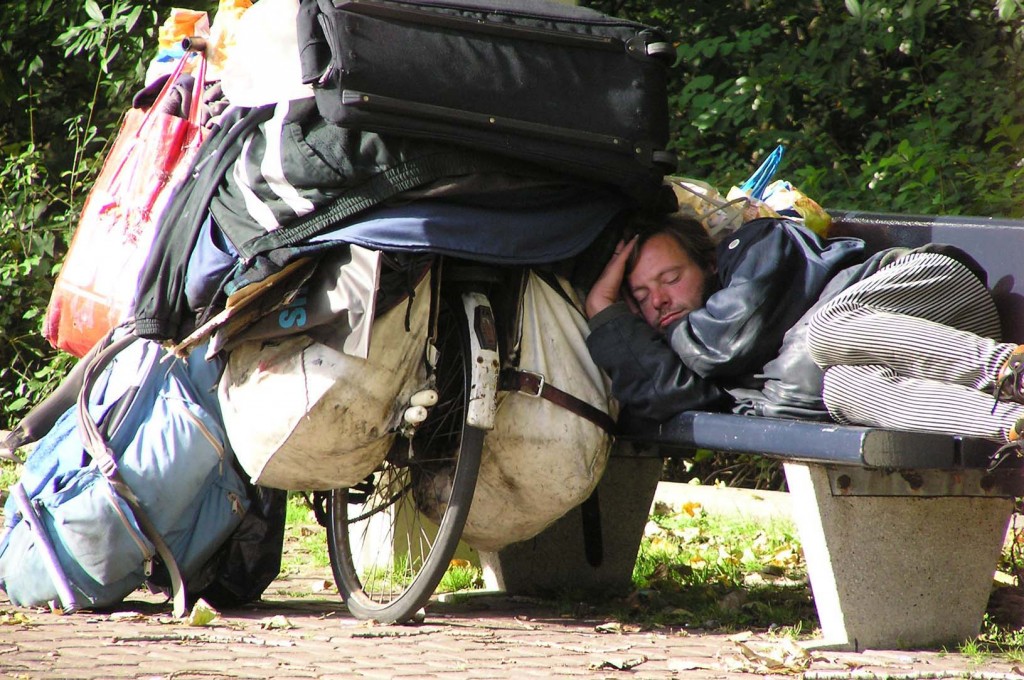Author’s note: I was inspired to write this article after reading a piece in Christopher Alexander’s seminal book A Pattern Language. My article was published in the Nordis Weekly issue of July 30, 2006.

Many of us well-settled city folk bear a “siege” mentality. We view our homes as a fortress where we can safely rest and refresh ourselves, before we sally forth anew into the chaotic urban war zone. So we do most of our sleeping (when we are most vulnerable) at home – in our bedroom or living room.
We would be appalled to even consider the idea of sleeping in public places. That’s OK in camp-outs and beaches and bus terminals, where such behavior is expected, we say to ourselves, but not in the city’s streets, parks and other pedestrian places. That, we say, is for beggars and homeless people.
Why sleep in public?
Yet sleeping outdoors is one of the most natural and exhilarating modes of rest, as every camping or outdoors enthusiast knows.
Filipino peasants maintain a semi-open hut in their distant fields or swidden farms, where they can rest, cook lunch, and escape the intense midday heat, even stay overnight. In small towns, people would indulge in siestas in the plaza or churchyard, perhaps underneath a century-old banyan or acacia tree.
In the big city, however, it’s different. If you sleep in a public place, you may get your butt kicked by a security guard for loitering or arrested by the police for vagrancy. Worse, you could get mugged or molested. Not to mention the many vagaries of drenching rain, scorching sun, and insect bites.
Now, please disabuse yourself of the myth that only beggars and homeless people need to sleep in city streets. For many commuters, working or studying away from home much of the time creates a need for accessible public places where one can take a quick nap or even stay overnight if necessary.
In commercial districts – whether of a Third World urban center like Metro Manila or Baguio or a cosmopolitan behemoth like Los Angeles – the streets overflow with informal business the whole day and deep into the night: vendors plying their wares, market traders unloading farm produce from the provinces, construction workers needing to sleep, rest and clean up near their construction site, applicants looking for work and a place to stay – not to mention homeless people scrounging for their means of daily survival.
In short, people who find themselves in the big city and away from home would want to catch a wink any time and any place they could. For most of them, renting a room is too expensive. The only solution is for the city to offer them fairly safe and comfortable, but free, public places for sleeping.
Singaporean solution?
Decades ago, when Philippine life was much simpler, ordinary people could still freely and safely sleep on benches in city parks and plazas, in bus terminals and hospital lobbies, inside churches and funeral parlors, night after night after night, without encountering much danger and disturbance.
I had a writer-friend who, in the late 1970’s, could still sleep among the vendors of Avenida Rizal for seven straight nights – he was writing about homeless people – and not worry about getting mugged or hauled into the police precinct. Another artist-friend could spend P5 or P10 on a first-class moviehouse ticket and sleep away a stifling summer afternoon in cushioned, air-conditioned comfort. That was before ticket prices became prohibitive.
Nowadays, however, while there are more and more street people, their sleeping options are getting fewer and fewer. It has become a fad among city mayors and other urban administrators to imitate the harsh policies of Singapore dictator Lee Kuan Yew and his successors. The dregs of society – whether garbage, stray animals, or impoverished humans – must be swept off the streets for the good of all.
Protect the right to sleep in public
The longest-term solution should be sought in overhauling our society, especially our basic socio-economic system, so that poverty and government neglect of basic services – which breed homelessness, unstable homes and street crime – are finally eradicated. These are the key factors that force people to live in the streets despite harsh conditions.
At the same time, there must also be a continuous struggle against ultra-conservative attitudes. Such values belittle people who live, loiter and sleep in the streets as social scum – nothing more than criminals, prostitutes and vagrants who must be swept off and kept away.
Rather, a progressive city planner or administrator must recognize the need for people to live in the streets, and must at least provide them with many places where they can do so in relative safety, shelter and comfort.
Such places could be in public parks (yes, even in cemeteries), beside public structures (yes, even under bridges and flyovers), around hospitals, schools and other public buildings, in reserved corners of public markets, even in some quiet and tree-shaded side-street corner.
Private service-oriented institutions like churches, radio-TV stations, transport firms, and malls should do the same. Isn’t it ironic that a real estate firm could build a giant mall with an enormous multi-storied garage so that its customers can park their gorgeous cars – and yet wince at the idea of giving free sleeping space for the weary poor who simply want to lie down and rest for a while?
Let’s dream of a city environment filled with ample benches and raised pavements, whether stand-alone or built into flowerbox seats, low walls or building alcoves, sheltered by trees or sturdy awnings, away from wind and rain, and lighted at night. Street people should be allowed to set up simple stoves or fireplaces so that they can at least warm their food with scrap fuel.
If more and more people begin to frequent these places, then so much the better because muggers and molesters are less likely to attack in the middle of a crowd.
All these will be utopian dreams, however, if we do not revolutionize society and emancipate the poor. But continue to dream we must, until that time when people no longer feel any fear or shame in going to sleep in public when they need or want to.
###

